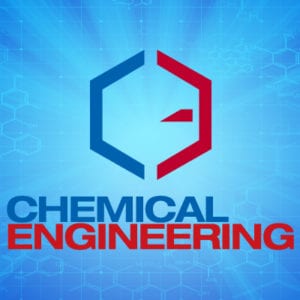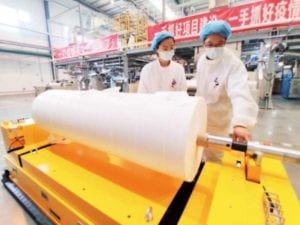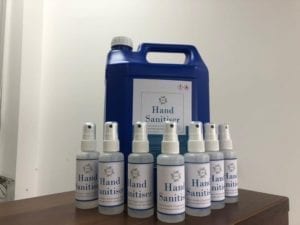Designing with fluoropolymer components for combating corrosive chemicals
FREE
REGISTERMaintenance and design engineers are increasingly searching for lightweight and cost-effective materials like plastics, which are easy to fabricate, and are capable of providing extended service life in a given application. For these reasons, plastics are being considered more frequently as the material of choice when designing components for use in chemical plants. However, choosing the correct plastic for the application is critical, as plastics offer an incredibly broad range of performance characteristics. For many decades, engineers have specified fluoropolymers, a specific family of plastics, for their plant’s critical fluid handling systems to transport some of the world’s harshest and most corrosive chemicals safely and dependably. Fluoropolymers offer a unique combination of thermal stability, chemical and corrosion resistance, and ultra-high purity that make them the ideal choice for a wide variety of applications.
This webinar will provide engineers and plant personnel case histories identifying where fluoropolymers, like Kynar® PVDF and Kynar Flex® PVDF, are currently used, why they were specified, and where they have been successfully handling the most corrosive and highly critical fluids for years. Performance against various chemistries such as concentrated strong acids, chlorinated solutions, and chemical mixtures will be discussed. Engineers will also learn about how to fabricate with fluoropolymers, including pipe joining methods, vessel fabrication, and tower packing considerations. By learning some of the sweet spots for fluoropolymers in chemical applications, engineers can design and implement longer lasting and more dependable fluid handling systems in a chemical plant’s harshest environments.
SUEZ to provide waste-management services for 20 Arkema sites in France
Building on their 12-year partnership, Arkema S.A. (Colombes, France) and SUEZ (Paris, France), are renewing their contract for the next three years, for a total of €38 million revenue. SUEZ will manage and recover around 60,000 tons of waste per year. This partnership will ensure Arkema’s business continuity and contribute to its economic and environmental performance.
The new contract is consistent with SUEZ’s Shaping SUEZ 2030 strategic plan, which aims, in particular, to accelerate growth with industrial customers and roll out innovations and digital solutions in high value-added activities.
Within this contract SUEZ is developing solutions aimed at optimizing the management and recovery of all industrial waste produced on 20 sites located across France. Nine experts will oversee the contract’s day-to-day performance, managed by Industrial Waste Specialties (IWS), a SUEZ entity that specializes in hazardous waste management and recovery in Europe. Working closely with Arkema’s Environment services, IWS’ teams are committed to driving forward progress and reducing the environmental footprint.
Beatriz Mendez, Vice President of Goods & Services Procurement of Arkema, commented: “In response to the Covid-19 pandemic, Arkema fully mobilized to ensure business continuity in an effort to provide products and services that are essential to strategic sectors of activity. SUEZ’s teams also rallied together, playing an active role on the ground to treat and recover waste. In doing so, they ensured that our production chain remained unbroken and helped us to ensure service continuity.”

Arkema to acquire thermobonding specialist Fixatti
Arkema S.A. (Colombes, France) announced the proposed acquisition of Fixatti, a company specialized in high-performance thermobonding adhesive powders. This acquisition will enable Bostik to strengthen its global offering of hotmelt adhesive solutions for niche industrial applications in the construction, technical coating, battery, automotive, and textile printing markets. This project is part of Bostik’s targeted growth strategy in high value-added technologies, and is perfectly in line with the Group’s roadmap to become a pure Specialty Materials player by 2024 centered around Adhesive Solutions, Advanced Materials, and Coating Solutions. Fixatti is an internationally renowned company, which operates two sites in Europe and one in China, employs 180 people, and reports sales of some €55 million.
Thanks to its grinding, polymerization and compounding capacities, Fixatti develops and markets a diversified range of high-performance, environmentally friendly thermobonding powders. The company thus offers solutions that address many of the bonding issues arising in the construction, technical coating, battery, automotive, and textile printing sectors.
Fixatti’s copolyester and copolyamide polymerization capabilities also present strong synergies with one of Bostik’s historic areas of expertise. Following the acquisition of Prochimir in adhesive films last year, the excellent geographic and technological complementarity of this acquisition will enable Bostik to become a world leader in innovative and high-value-added thermobonding solutions.
This acquisition is perfectly in line with the Group’s strategy to complement the organic growth of its Adhesive Solutions segment with high-quality bolt-on acquisitions. With a significant potential for synergies, it will also contribute to the Group’s ambition to increase this segment’s EBITDA margin to 16% by 2024.
Closing of the deal is expected in fourth quarter 2020, subject to approval by the antitrust authorities in the relevant countries.

Arkema invests in U.S. anhydrous hydrogen fluoride production
Arkema S.A. (Colombes, France) has announced a long-term partnership with Nutrien Ltd, the largest integrated agricultural company in the world, for the supply of anhydrous hydrogen fluoride to Arkema’s Calvert City (Kentucky) site. This project has many advantages, as it secures a competitive access to anhydrous hydrogen fluoride, the main raw material for fluorine chemistry, it supports the growth of fluoropolymers in the attractive segments of water treatment, electronics and batteries, and it offers greater environmental protection than more traditional production processes.
About half of the supplied materials will be used for the production of high-added-value polymers and fluoro-derivatives, and the remainder for the production of low-GWP (global warming potential) fluorogases. This raw material is key to the manufacture of fluorine chemistry, including fluoropolymers and specialty derivatives.
As part of this agreement, Arkema will invest $150 million in a 40,000 ton/year AHF production plant at Nutrien’s site in Aurora (North Carolina), scheduled to start up in the first half of 2022. The agreement includes the establishment of a long-term supply contract.
In line with the group’s commitments for the environment, this AHF will be produced using an element that occurs naturally in the phosphate that Nutrien uses to manufacture its products, replacing the more usual source of mined fluorspar. Nutrien will recover the fluoride from its process and convert it to AHF at its Aurora site. This innovative investment is the first of its kind in the United States, and is perfectly in line with the Group’s new climate plan as it reduces overall energy consumption and greenhouse gas emissions.
Beyond its favorable impact on the environment, the partnership offers other important benefits. In a context of growing tensions regarding mined fluorspar and AHF supply, it aims in particular to secure the supply of AHF at a stable and competitive price, and support the constant development of new applications, notably for batteries, 5G electronics, and water treatment.
This project enables Arkema to grow, in the United States, its fluorinated polymers and other fluorinated specialty derivatives within the Specialty Materials platform in a sustainable way and it strengthens the long-term competitiveness of its emissive fluorogases.

COVID-19 Roundup: Across the globe, CPI companies provide essential supplies
Many chemical processing and engineering companies are contributing to efforts to fight the spread of COVID-19:
PKN Orlen (Płock, Poland) has provided the Vatican and the Office of Papal Charities with protective products to help combat the COVID-19 pandemic. The protective products will be distributed to Vatican Gendarmerie units, which helped organize the World Youth Day in Poland, to the Swiss Guard, who are responsible for Pope Francis’s personal security and, first and foremost, to the needy, including the homeless, migrants, and residents of nursing homes. The aid donated by PKN ORLEN included 705,000 disposable masks, 30,000 masks made by Poland-based company Brubeck, 3,600 5-L containers of hand sanitizer liquid, 3,200 5-L containers of surface disinfectant, and 10,000 protective coveralls. Personal protective equipment was also sent by PKN ORLEN to Lithuania, to be provided to the Lithuanian government and to institutions which need it most.
Sinopec (Beijing, China) subsidiary Sinopec Yizheng Chemical Fiber Co Ltd. put its 12th meltblown non-woven fabric production lines into operation on May 9. Sinopec has now completed the construction of all its 16 meltblown non-woven fabric production lines to make materials for masks. After the full operation of the 16 production lines and together with Sinopec’s joint venture enterprises that can produce seven metric tons of meltblown non-woven fabric every day, the daily production capacity of the company is expected to reach 37 metric tons, and its annual production capacity will exceed 13,500 metric tons, enough to make 13.5 billion medical face masks. According to Sinopec, it took only 76 days to construct the world’s largest meltblown non-woven fabric production base from the commencement on February 24 to full operation on May 9.

Sinopec puts its 16th meltblown non-woven fabric lines into production (Source: Sinopec)
Arkema Inc. (Colombes, France) contributed hand sanitizer solution to the New York State Office of Emergency Management, Pennsylvania Emergency Management Agency, Texas Division of Emergency Management and Tennessee Emergency Management Agency. It is meant for distribution to health organizations in areas that have been hard hit by COVID-19. Arkema has repurposed a production line at its plant in Geneseo, N.Y. to manufacture 38,000 liters of hand sanitizer solution. This solution has been donated to New York, Pennsylvania, Tennessee and Texas, where the company has a key presence.

Corrosion-inhibitor manufacturer Hexigone has shifted its production capabilities to also make hand sanitizer for pandemic response needs (Source: Hexigone)
Hexigone Inhibitors Ltd. (Port Talbot, U.K.), a manufacturer of corrosion inhibitors, has begun manufacturing hand sanitizer to help protect staff on the pandemic front line. The sanitizer, which meets the standard set by the World Health Organization, is already in use in local organizations. The U.K. Government’s innovation agency, Innovate UK, linked-up Hexigone with pharmaceutical giant Glaxosmithkline, who subsequently donated 8,000 L of isopropanol to ramp-up production. The project started via the South Wales Additive and Rapid Manufacturing (SWARM) Consortia as a joint venture with Swansea University. And after some joint-learning when setting up the manufacturing process, the teams divided their efforts to increase output to the front line.
Merck KGaA (Darmstadt, Germany) says that it has provided 800,000 surgical face masks in the U.S. for use as part of urgent efforts to address the outbreak in New York and New Jersey. Merck typically uses these types of masks, and others, in many aspects of its manufacturing and research work. The company continues to look closely at available supplies of personal protective equipment and other supplies for potential use by health care workers, and plans to partner with health authorities to allocate those supplies to areas of need.
